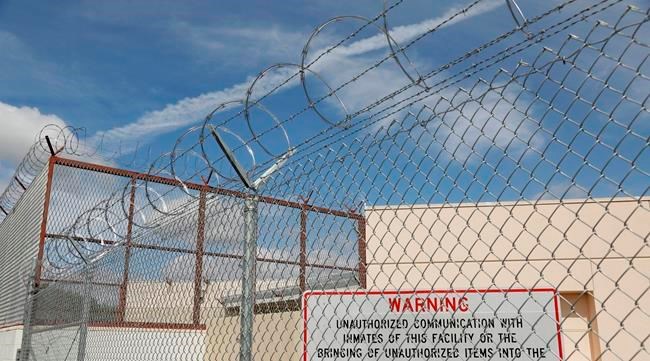TORONTO — The crisis in Canada's bail system has worsened over the last decade, with more people in pre-trial custody and some spending weeks in detention before being released on bail, according to a new report that calls for major reforms.
A report released Monday by the Canadian Civil Liberties Association says that by 2021-2022, the proportion of people in provincial and territorial jails who were awaiting bail or trial reached a record level of more than 70 per cent – and nearly 79 per cent in Ontario.
That's compared with just over 54 per cent in 2014, when the association released its initial report on the issue.
The rate of pretrial detention has more than doubled over the last 40 years, and the number of people in pretrial custody has quadrupled in that period, said Nicole Myers, one of the report's authors.
"Legislation alone will not fix this problem – we need to change the culture of bail court decision-making," said Myers, an associate professor of sociology at Queen's University.
"At its core, we must remember that innocent people are being jailed. Many of these folks are not subsequently found guilty of the offences it's alleged that they've committed," she said. "So the reality is that people are being punished, they are serving what amounts to a sentence prior to and often in the absence of conviction."
Across Canada, 51 per cent of cases end with all charges withdrawn, meaning the accused is not found guilty of the alleged crime, she noted.
The report focuses on five provinces and territories: British Columbia, Yukon, Manitoba, Ontario and Nova Scotia. Researchers monitored 79 days of bail court between November 2021 and November 2022, tracking what happened in the courtroom. They observed 1,284 bail appearances, and conducted interviews with 33 justice system professionals.
While there are "clear timeframes" in the Criminal Code to ensure people don't "languish in pre-trial custody," as well as guidance from the Supreme Court of Canada on the matter, the ongoing strain on the court system contributes to major delays in the bail process, the report said.
On any given day, most cases in bail court are adjourned, often because the court ran out of time, the report said. One possible step to consider would be encouraging courts to stay open until all bail matters for the day have been heard to completion, Myers said.
"Very few people are formally denied bail. Lots of people are held in limbo, where they stay in pretrial detention until the resolution of their charges without a bail decision being made," she said.
Another option to consider would be decriminalizing charges related to not showing up for court or failing to comply with the conditions of release, she said.
During their observations in court, the people released on bail faced an average of 5.9 different conditions, up to a high of 24, she said. None were released without conditions. The report notes many conditions imposed "may be difficult or impossible for (people) to comply with."
Some common conditions include weapons bans, not going to a particular place or contacting specific people, she said. Others include residential requirements, reporting requirements and curfews. There has been a reduction in substance abstinence and treatment-based conditions in light of a 2020 Supreme Court ruling, Myers said.
Bill C-75, which was enacted in 2019, created what's known as a judicial referral hearing, a mechanism meant to avoid re-arresting and detaining people who are charged with breaching their bail conditions, the report said. However, it found that in many provinces and territories, that mechanism was not being used.
Shakir Rahim, director of the CCLA's criminal justice program, said the report's findings illustrate why it's important that judicial appointments remain nonpartisan, a reference to comments made last week by Premier Doug Ford.
On Friday, Ford defended his government's appointments of two former staffers to a committee that helps select provincial judges, saying his Progressive Conservative government got elected "to get like-minded people in appointments."
The premier suggested that judges and justices of the peace are too lenient on criminals, and are letting people out on bail too frequently, so he wants to see more judicial officials appointed who will keep people in jail.
Rahim said Monday that appointments should be based on merit, and "injecting different concerns" into the process is "deeply worrying and concerning."
"There's always been some degree of discretion that the government has possessed to appoint individuals to these committees," he said.
"The concern I think that arises here in particular is that the premier has discussed the motivation for these appointments as explicitly being to alter how justice of the peace and judges are making decisions in accordance with the law."
The premier's office did not immediately respond to a request for comment.
This report by The Canadian Press was first published Feb. 26, 2024.
Paola Loriggio, The Canadian Press



